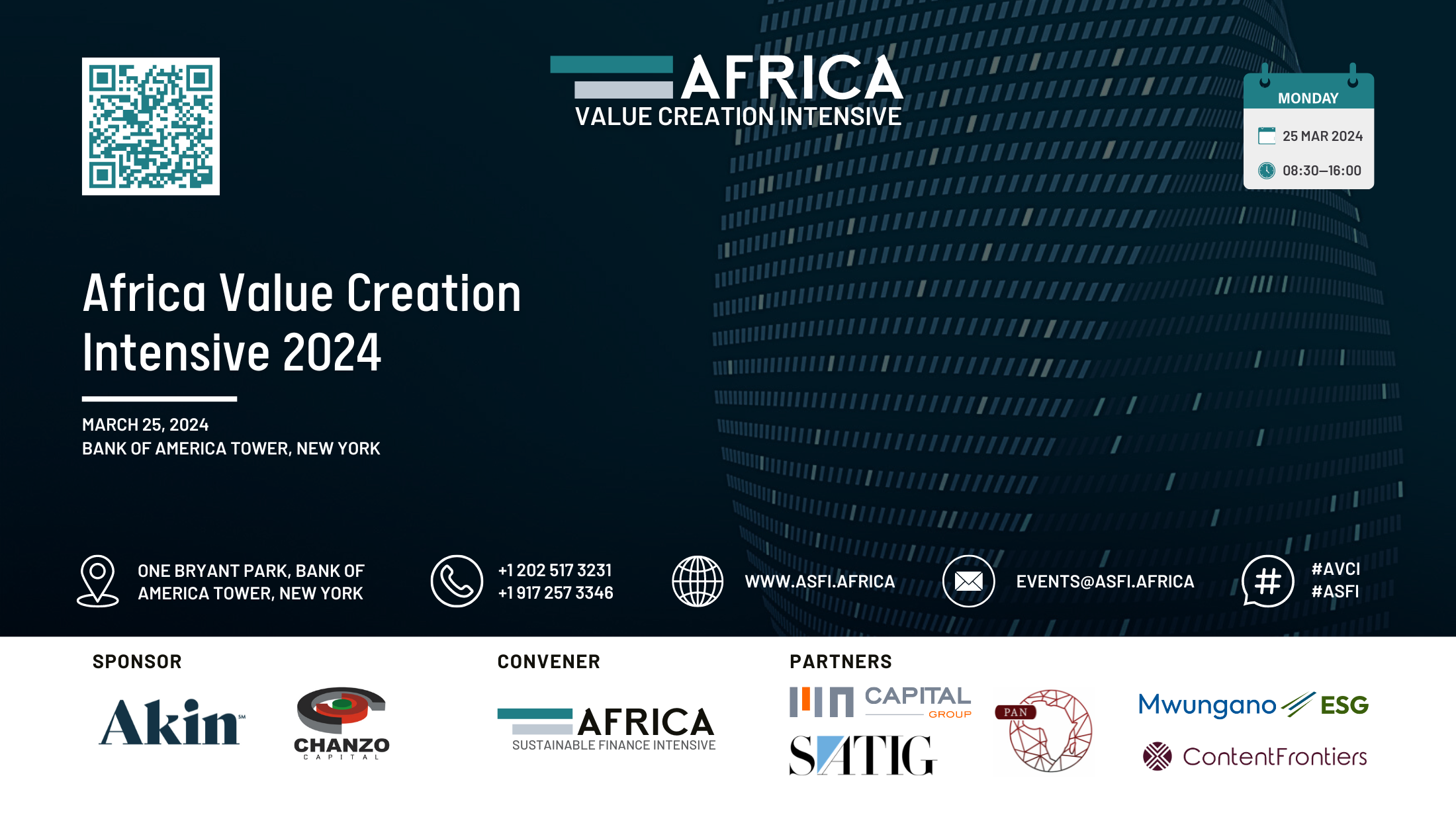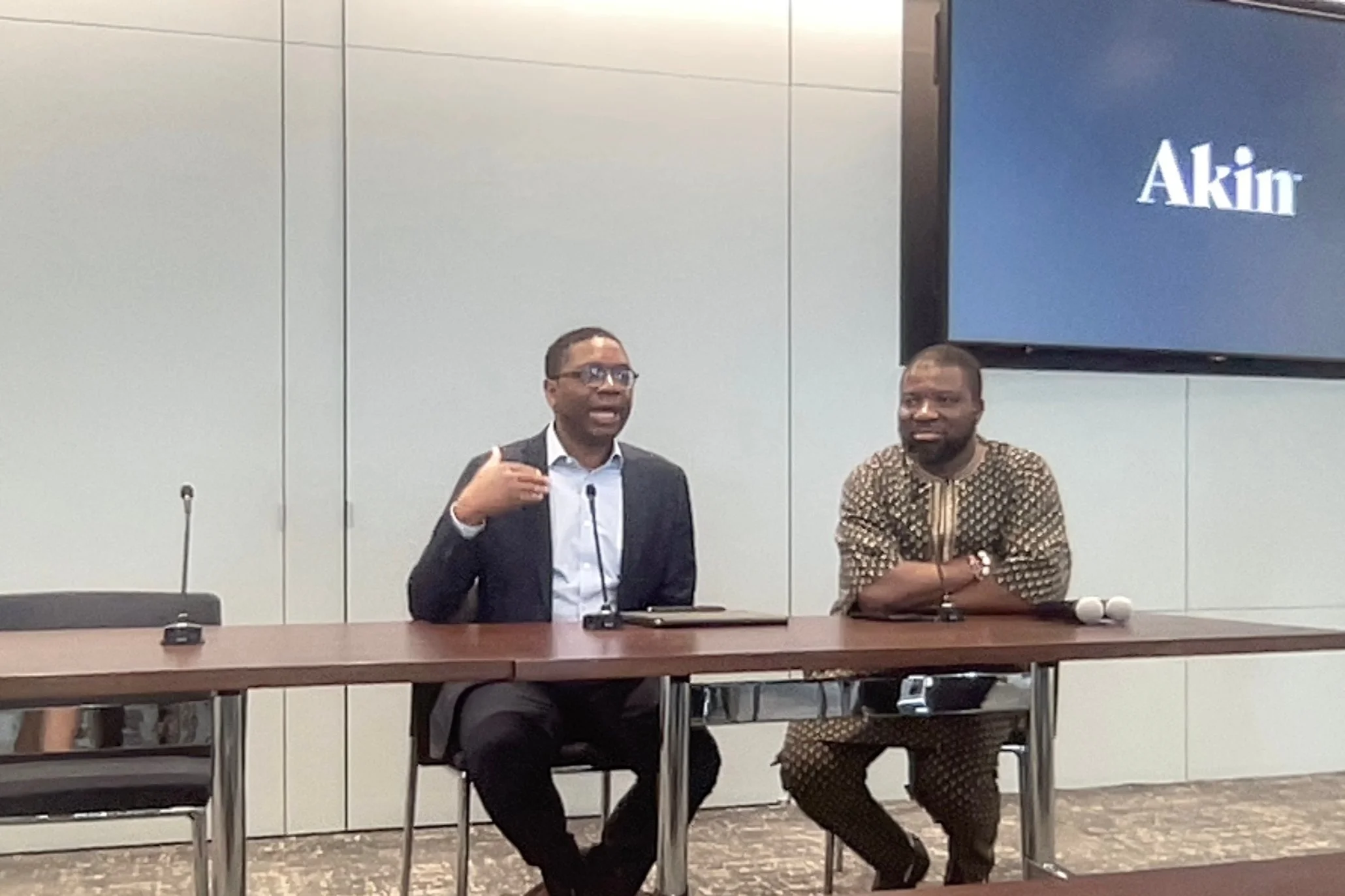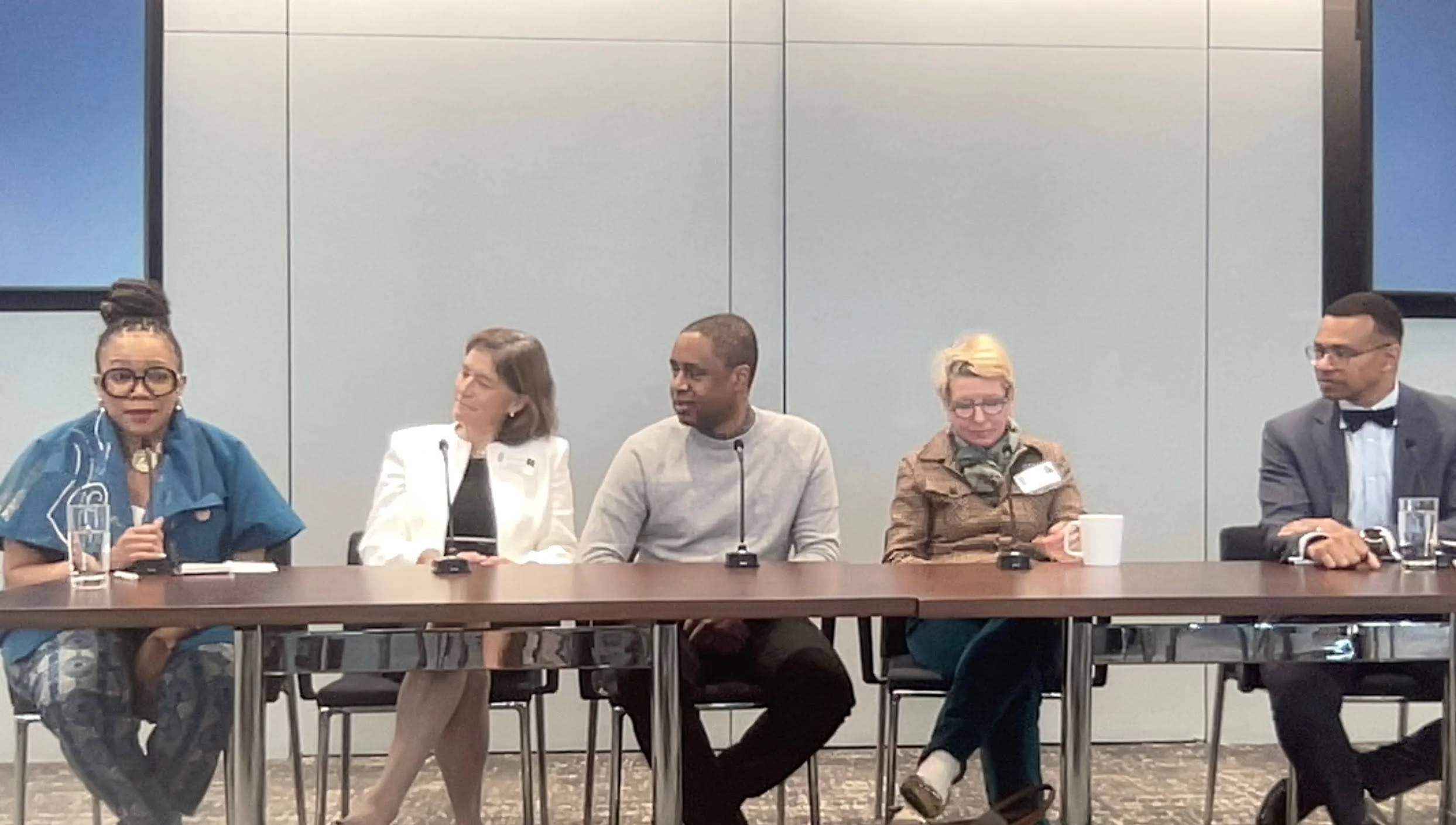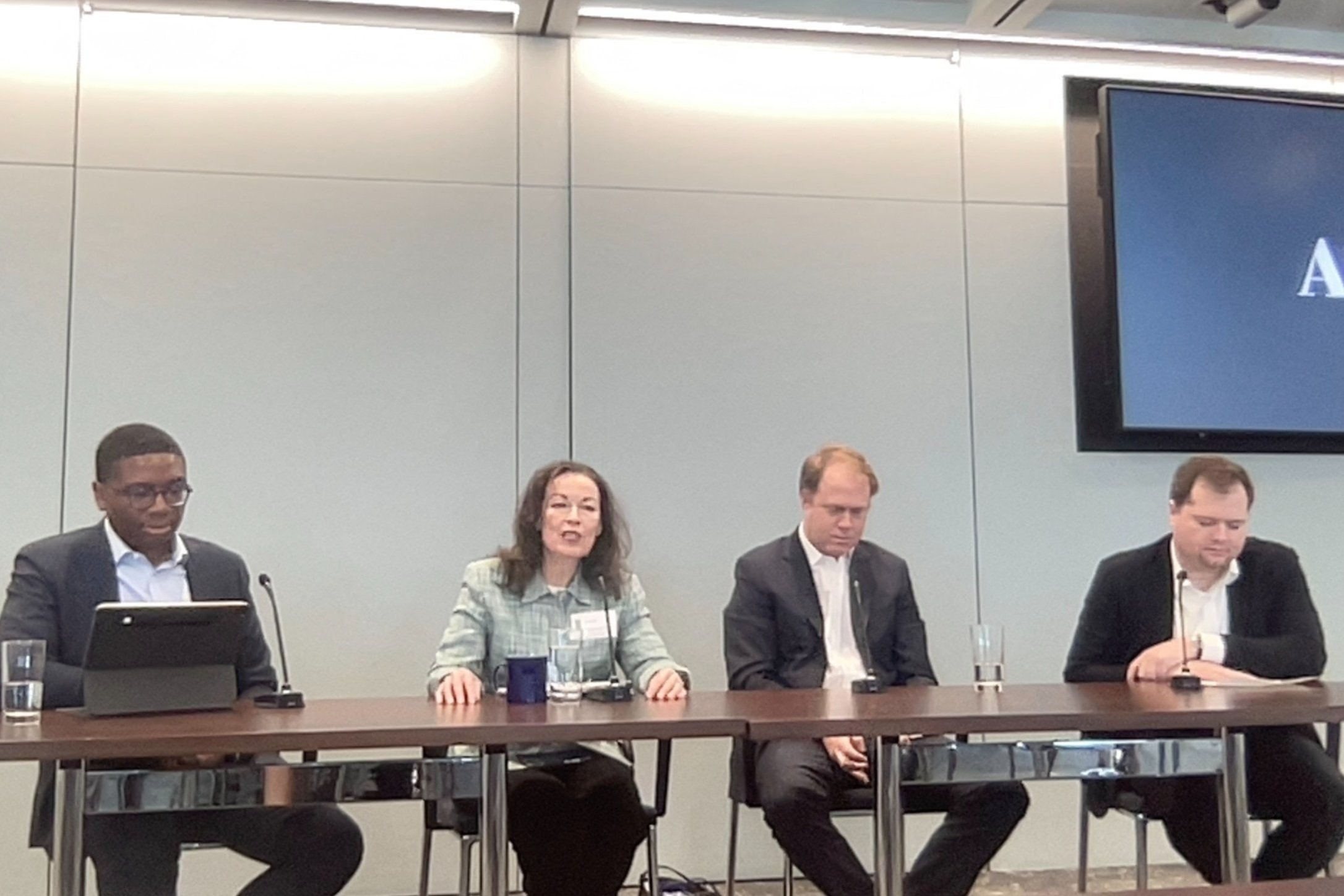Key Insights & Takeaways | Africa Value Creation Intensive 2024
Leading private capital professionals gathered for the Africa Value Creation Intensive (AVCI) on March 25 at the Bank of America Tower in New York City to engage in forward-thinking panel discussions on the role of private capital investments in driving system-level value creation and building systemic resilience across key growth sectors in Africa.
Panel discussions covered a wide range of topics, including creating value through asset management, unlocking Africa's fintech potential, and addressing systemic risk factors associated with private credit. Investors also shared market insights and offered practical solutions for harnessing investment opportunities while navigating the challenges of financing and infrastructure gaps on the continent.
The AVCI 2024 was hosted by Akin Gump Strauss LLP and sponsored by Chanzo Capital. ContentFrontiers was the Content Partner for AVCI.
Chairman’s Welcome & Opening Remarks
In the Intensive’s opening remarks, Eric Osiakwan, Managing Partner of Chanzo Capital and chair of AVCI 2024, delivered a strong message to private investors that sustainable investing that considers systems-level factors can ensure resilient value creation and generate long-term risk-adjusted returns.
“This fact is widely recognized,” said Osiakwan. "However, while asset owners and managers may understand the potential for generating value through sustainability, there still exist gaps in their knowledge regarding the range of levers that can be effectively deployed.”
Africa presents a unique opportunity for investors looking for long-term growth potential. Despite complex challenges that hinder growth in Africa, such as slow pandemic recovery, geopolitical tensions, and increasing debt-to-GDP ratios, Osiakwan challenged asset owners and managers to explore how sustainability and value creation intersect and harmonize their investment strategies and expertise to seize opportunities and uncover value creation.
Ike Emehelu, a Partner at Akin Gump Strauss Hauer & Feld LLP, outlined how his law office is engaged in legal advisory services and structuring contracts for African investments, largely in the energy sector. The law firm is committed to creating an interactive space for U.S. investors to deepen their connections and boost investment on the continent.
Setting the Scene
William Burckart, CEO of The Investment Integration Project (TIIP)
William Burckart, CEO of The Investment Integration Project (TIIP), set the stage for a wide-ranging panel discussion on building systems-level value creation and resiliency in African markets.
Social and financial systems are deeply interconnected. Complex challenges like Covid-19, climate change, and disrupted supply chains can threaten long-term investment returns. “Systems under stress create risk,” said Burckart.
Systems-level value creation is a way for investors to recognize how their investments can influence social, financial, and environmental systems in Africa. By enhancing these fundamental systems, investors can improve the performance of their portfolios.
Modern portfolios are influenced by risk, said Burckart. Investors should move beyond traditional investment approaches to a systems-level investment approach that builds systemic resilience across Africa, he emphasized.
PANEL: BUILDING SYSTEMIC VALUE RESILIENCE
L-R: Luc Rigouzzo, Co-founder & Managing Partner, Amethis; Roselyn Spencer, Managing Director, MiDA Advisors; and William Burckart, CEO, The Investment Integration Project (TIIP).
Moderator: Luc Rigouzzo — Co-founder & Managing Partner, Amethis
Roselyn Spencer — Managing Director, MiDA Advisors
William Burckart — CEO, The Investment Integration Project (TIIP)
Overview:
The pandemic highlighted the interconnectedness of global systems. A single shock can have far-reaching effects on markets, supply chains, and infrastructure, posing risks to people, the economy, and investments. In a post-pandemic world, private markets in Africa are still rethinking their strategies for creating value at a systems-level. The panel delved into how the integration of systems-
level considerations can help investors manage long-term risks and rewards while driving value creation at the portfolio and system-level.
KEY TAKEAWAYS
Recognizing that access to capital remains a challenge in Africa, panelists noted that greater collaboration and co-investment with other investors, including family office investors, can generate a positive impact on local economies.
Institutional investment was highlighted as a vehicle to help close the investment gap in Africa and drive value creation. Examples were given of institutional investors forming consortiums to channel their resources into infrastructure and climate adaptation projects. Taking this approach requires investors to be intentional in adopting sustainable investment strategies that align investments with achieving a positive impact.
Private equity investment is an effective way to drive growth in Africa, yet it can take 15 to 20 years to deliver returns. Private equity firms are increasingly diversifying their approaches to creating value and taking a long-term approach to their portfolio.
PANEL: EMBEDDING VALUE CREATION THROUGH ACTIVE MANAGEMENT
L-R: Reed Morrissey, Partner, Baylis Emerging Markets; Peter Maila, co-CIO, FMO: Dutch Entrepreneurial Development Bank; Rafik Mzah, Group General Secretary, AfricInvest; and Nicolas Martin, Partner, Baylis Emerging Markets
Moderator: Nicolas Martin — Partner, Baylis Emerging Markets
Rafik Mzah — Group General Secretary, AfricInvest Group
Peter Maila — co-CIO, FMO: FMO - Dutch entrepreneurial development bank
Reed Morrissey — Partner, Baylis Emerging Markets
Overview:
Investors are responsible for assessing and validating environmental, social and governance (ESG) integration approaches such as active, quantitative, passive, and smart beta, into their portfolios. This challenge creates opportunities for private equity managers who take a more active approach toward portfolio management. The panel explored which strategies and sustainability levers have the potential to drive material value creation.
KEY TAKEAWAYS
Environmental, Social, and Governance or ESG is a set of criteria to measure the sustainability and impact of their investments. Panelists acknowledged that some investors still question whether incorporating ESG into their portfolios could negatively impact their returns. Panelists, however, pointed out that this is a common misconception; and that ESG can enhance returns by facilitating responsible long-term investments.
ESG investments can deliver impact without sacrificing returns. Measuring the the outcomes of ESG investments is essential, panelists agreed, noting that there is no one-size-fits-all solution for measuring impact. Investors need to be agile in their approach to impact measurement of their investments.
Having a clear action plan for implementing ESG is essential for investors. The panel stressed the importance of distinguishing between an ESG approach and impact. An ESG approach focuses on good governance and sustainability, while impact focuses on delivering a positive social or environmental outcome.
PANEL: UNLOCKING FINTECH POTENTIAL TO DRIVE VALUE CREATION
L-R: Busie Matsiko, Executive Director, Africa Future Summit; Monica Brand Engel, Co-founder and Managing Partner, Quona; Claude Grunitzky, Managing Partner, The Equity Alliance; Margaret O'Connor, Chairperson, Launch Africa Ventures; and Jay Taylor Corporate and Finance, Anderson Kill
Moderator: Jay Taylor — Corporate and Finance, Anderson Kill
Claude Grunitzky — Managing Partner, The Equity Alliance
Monica Brand Engel — Co-founder and Managing Partner, Quona Capital
Margaret O'Connor — Chairperson, Launch Africa Ventures
Busie Matsiko-Andan — Executive Director, Africa Future Summit
Overview:
African fintech companies are entering a new era of value creation, influenced by a sizable unbanked population and increased internet access. However, the challenging macro environment has intensified competition, resulting in fewer deals and reduced risk-taking. The panel discussed how fintechs can drive sustained growth and contribute to value creation in Africa. Investors also explored what optimization strategies can be deployed in Africa.
KEY TAKEAWAYS
By 2030, a majority of the world’s youth will be in Africa, making the continent ripe with opportunities for investment in fintech. Recognizing that private capital investment in Africa’s tech sector is inconsistent, panelists noted that investors need more market insights and education to better understand the challenges and opportunities in the African market.
The current lack of investment in the tech sector can be addressed through improved regulations and a supportive regulatory environment. Investors can press African governments to make increased public sector investments in improving internet connectivity and regulatory environments.
Panelists acknowledged that global investors are often unaware of key players in the investment ecosystem. To fully maximize investment opportunities, investors need to stop “gatekeeping” and build an ecosystem that includes all relevant stakeholders. Engaging the African diaspora is often overlooked but can bring valuable talent to the table. It's important to attract the "right people in the room" to ensure that portfolio investments are effectively tracked and value is created.
PANEL: PRIVATE CREDIT: SYSTEMIC RISK OR INHERENT VALUE TO THE ECONOMY?
L-R: Ike Emehelu, Partner, Akin Gump Strauss; Joan Trant, Managing Partner and Director of Impact, TriLinc Global; Rory Callagy — Managing Director, Moody's Investors Service; and Tom Brigandi, Managing Director RisCura Solutions (U.S.A.)
Moderator: Tom Brigandi — Managing Director, RisCura Solutions U.S.A
Joan Trant — Managing Partner and Director of Impact, TriLinc Global, LLC
Rory Callagy — Managing Director, Moody's Investors Service
Ike Emehelu — Partner, Akin Gump Strauss LLP
Overview:
Private credit has become a significant source of capital, offering investors better returns and greater flexibility. However, the private credit market is not transparent, which poses challenges, especially as the market grows and credit pressures increase. Experts suggest that Africa, with its unique economic challenges, may be particularly vulnerable to the systemic risks associated with private credit. In this discussion, the panel explored the primary credit risk factors that affect private credit and evaluated whether it presents a systemic risk to the wider economy.
KEY TAKEAWAYS
Private credit is changing the landscape for funding growth companies in Africa. Private credit and Development Finance Institutions (DFIs) are two options to attract long-term capital. Government bonds are viable options for investors seeking a low-risk, fixed-income investment.
Systemic risk in the African markets must be considered when making investment decisions. A prudent approach to lending is key to advancing growth, a panelist pointed out. Ultimately, the choice between the investment instruments depends on an investor's risk appetite and overall portfolio strategy.
Investors looking to minimize credit risks should consider investing in African countries that are making strides in growth, stability, GDP, and a strong export market. African countries can make their markets more attractive to investors by improving access to reliable internet connectivity, well-maintained roads, and a robust banking system that provides access to capital. Global investors can also benefit from working with local agents and lawyers to help structure loans.
PANEL: DRIVING SUSTAINABLE INFRASTRUCTURE VALUE CREATION
L-R: Robert E. Minor III, President & CIO, Quadtech Systems; Ben Gyepi-Garbrah II, Managing Director, Satig; Dr. Marshall Lindsey, Capital Markets, Regiment Securities; and Eric Osiakwan, Managing Partner, Chanzo Capital
Moderator: Eric Osiakwan — Managing Partner, Chanzo Capital
Benjamin Gyepi-Garbrah II — Managing Director, Satig LLC
Marshall Lindsey, PhD — Capital Markets, Regiment Securities
Robert MinorIII — President & CIO, Quadtech Systems
Overview:
There is an urgent need to reduce greenhouse gas emissions by transitioning to a low-carbon economy. However, geopolitical tensions, supply chain disruptions, and rising inflation have led to an increased focus on energy security across Africa. The challenge lies in finding a balance between the imperative need for economic growth and socially inclusive value creation, while simultaneously building sustainable infrastructure that will enable Africa's energy transition. The panel discussed how governments, companies, and investors can work together towards this goal.
KEY TAKEAWAYS
Investing in Africa’s energy transition presents a significant opportunity, especially given the financing gap that exists in infrastructure development. Despite significant progress, approximately 43% of the continent’s population still lacks access to electricity, making a compelling case for investment in this sector.
By leveraging innovative financing options, investors can address climate change through carbon markets, attractively priced debt monetized in carbon credits, and bonds for value creation over time. This systems-level investment approach enables investors to make a positive impact on the environment and also secure attractive returns on their investment.
Panelists emphasized the importance of closing the digital divide in Africa while implementing processes and best practices that can prevent vulnerabilities and protect data and security. Increased investment in infrastructure projects, including electrification, internet connectivity, and road projects, should be prioritized to bolster sustainability and create value on the continent.
Upcoming AVCI sessions will focus on the creative industries, including sports, art, music, tech, architecture, and fashion, and conclude with the Sustainable Infrastructure in Africa Summit in Washington, D.C.
For more information, visit the Africa Value Creation website at https://asfi.africa.








